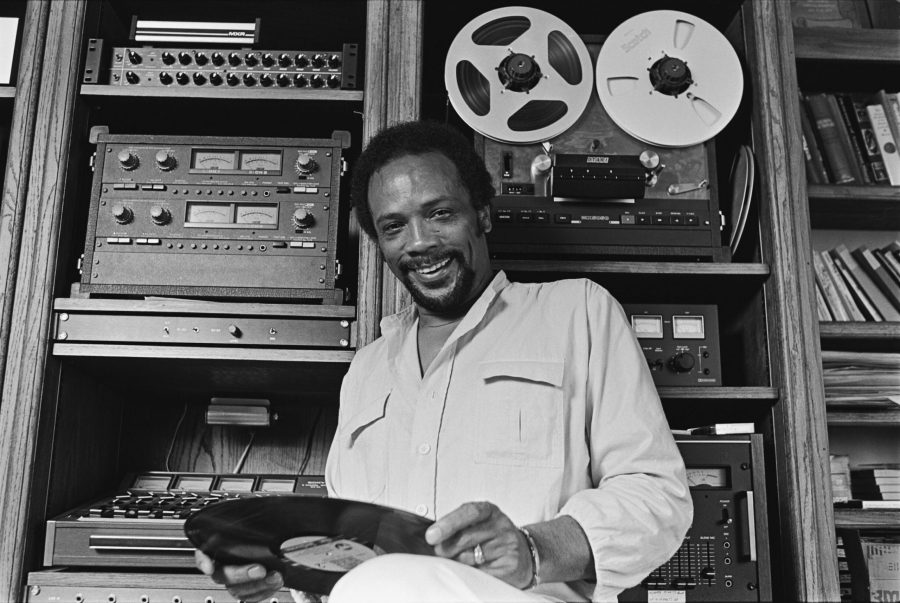OBITUARY: Quincy Jones leaves behind tremendous legacy

Quincy Jones in his studio in 1980. Photo courtesy Wikicommons.
Legendary composer and producer Quincy Jones died Sunday, Nov. 4, at his home in Los Angeles He was 91.
having been born March 14, 1933 in Chicago.
One of the most-decorated icons in music, Jones was nominated for 79 Grammys—more than any producer and composer—and won 28. Best known for producing Michael Jackson’s Off the Wall, Thriller and Bad, which sold more than 135 million copies combined, he was also the mastermind of the “We Are the World” charity single, but his influence reached back much farther than pop music.
His first Grammy win in 1962, was for his arrangement of Count Basie’s “I Can’t Stop Loving You.”
His involvement in music began at a young age. Jones attended high school in Seattle, where ehe played trumpet and learned musical arrangement. He started Seattle University before transferring to what’s now Berklee College of Music in Boston.
He toured with jazz bandleader Lionel Hampton and composed for Dinah Washington, Dizzy Gillespie and Ray Charles. He worked as a studio musician for CBS in New York, then studied composition and arranging in Paris and worked as musical director for French record label Barclay. He toured Europe with his band The Jones Boys, a jazz outfit of 18 musicians.
The president of Mercury Records, Irving Green, gave Jones his big break, offering him the position of vice president, making him the first Black record executive. While he originally wasn’t excited about producing pop, he scored his first big hit with Lesley Gore’s “It’s My Party.”
In 1958, Frank Sinatra personally asked Quincy Jones to arrange It Might As Well Be Swing, which included “Fly Me to the Moon.” They remained close friends until Sinatra’s death in 1995.
Jones began composing film scores in the 1960s, including “In Cold Blood,” which earned him his first Oscar nomination. He also composed the theme song to TV show “Sanford & Son” and won an Emmy for scoring “Roots.” In 1978, his work on “The Wiz” introduced him to Michael Jackson, which began their collaboration.
Off the Wall’s biggest singles were passed over by the Recording Academy for Grammy’s biggest awards (“Don’t Stop ‘Til You Get Enough” was relegated to R&B and disco nominations). Jones and Jackson then teamed up with Paul McCartney, hoping for a crossover hit similar to McCartney’s with Stevie Wonder, “Ebony and Ivory.” Jackson and McCartney recorded “The Girl is Mine,” which climbed the charts. This enabled Jackson—and others, ultimately—to successfully cross over from R&B to pop and other genres.

Quincy Jones and Michael Jackson attend the 26th Annual Grammy Awards at Shrine Auditorium in Los Angeles, on Feb. 28, 1984. Photo by Ron Galella, Ltd. via Getty Images.
Thriller become a cultural phenomenon. It not only revolutionized pop music by crossing genres, but raised quality standards of music videos from low budget to cinematic. Before Jackson, MTV mostly aired videos by white artists. Thanks to Jones and Jackson’s efforts, as well as studio pressure, “Beat It,” “Billie Jean” and “Thriller” made it onto heavy rotation on the TV network.
Quincy Jones infused Thriller with jazz (“Baby Be Mine”), African influences (“Wanna Be Startin’ Somethin’”), pop and rock. Toto contributed on “Human Nature” and Eddie Van Halen played the guitar solo for “Beat It.” Jones looked to Prince’s “1999” as inspiration for the opening synth chords and classic horror actor Vincent Price to narrate the spooky outro for the title track.
“We Are the World” followed in 1985. It remains the best-selling single of all time.
Jones acquired the rights to Alice Walker’s novel “The Color Purple”, and asked Steven Spielberg to adapt it to film. Jones is widely regarded for Oprah Winfrey being cast, having seen her on the news in Chicago. The film received 11 Oscar nominations, including two for Jones. In 2016, he won a Tony for Best Revival of a Musical for “The Color Purple,” and produced the 2023 film version.
While composing and producing for others, Quincy Jones released his own music. His 1989 album, Back on the Block, featured numerous artists from Ella Fitzgerald to Ice-T. It won six Grammys, including Album of the Year.

Quincy Jones at the 24th Grammy Awards at Shrine Auditorium in Los Angeles on Feb. 28, 1984. Photo courtesy CBS.
Jones founded Qwest Records in 1980, then partnered with Time Warner a decade later to form his own entertainment company In 1995, Qwest Broadcasting Company acquired TV stations in Atlanta and New Orleans, making it the largest minority-owned broadcaster at the time. He also founded Vibe magazine in 1993, published Spin and Blaze, and served as the executive producer for “The Fresh Prince of Bel Air.”
Many of Jones’s accomplishments ended up blazing a trail for other artists of color. His accolades include Kennedy Center Honors, a National Medal of the Arts, and his most recent, a 2024 Honorary Academy Award.
In 2018, Netflix released the documentary “Quincy,” which was directed by Jones’ daughter, actor Rashida Jones.
Follow Talia M. Wilson at Twitter.com/olyfilmgirl.

